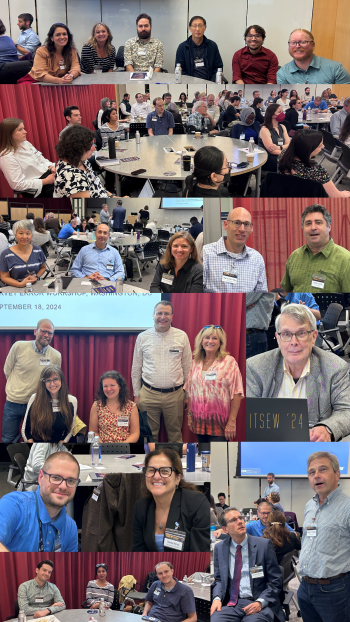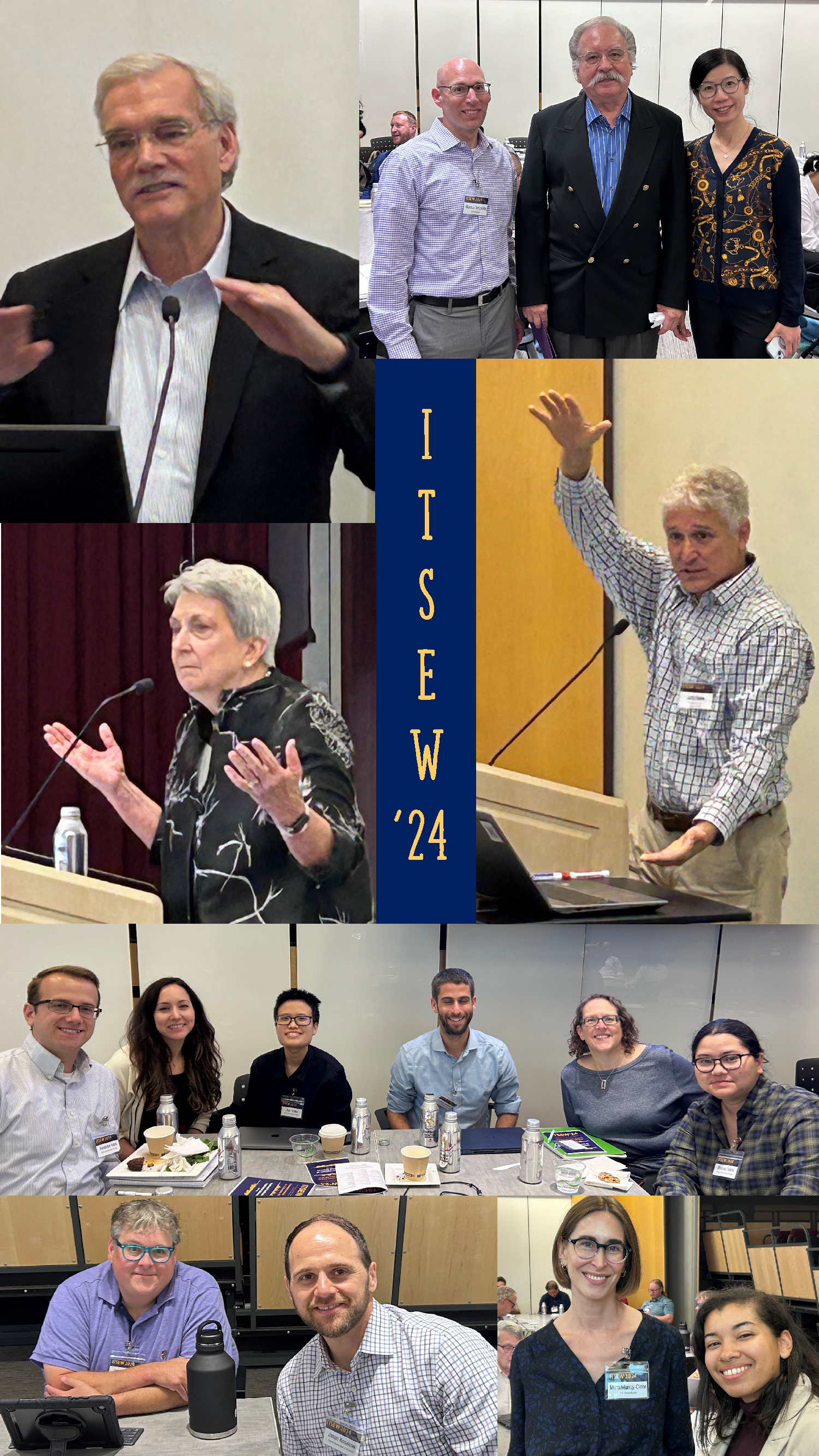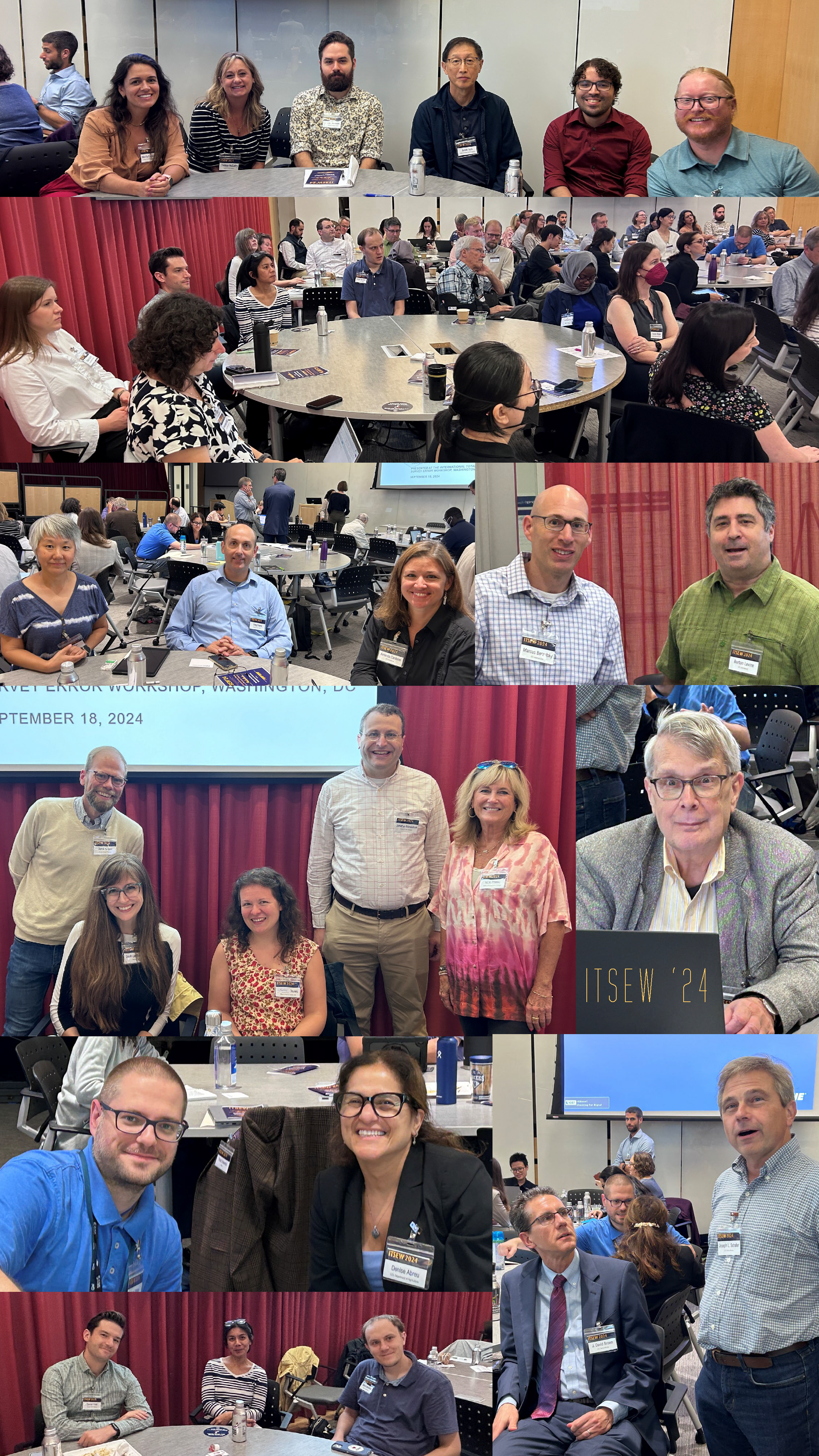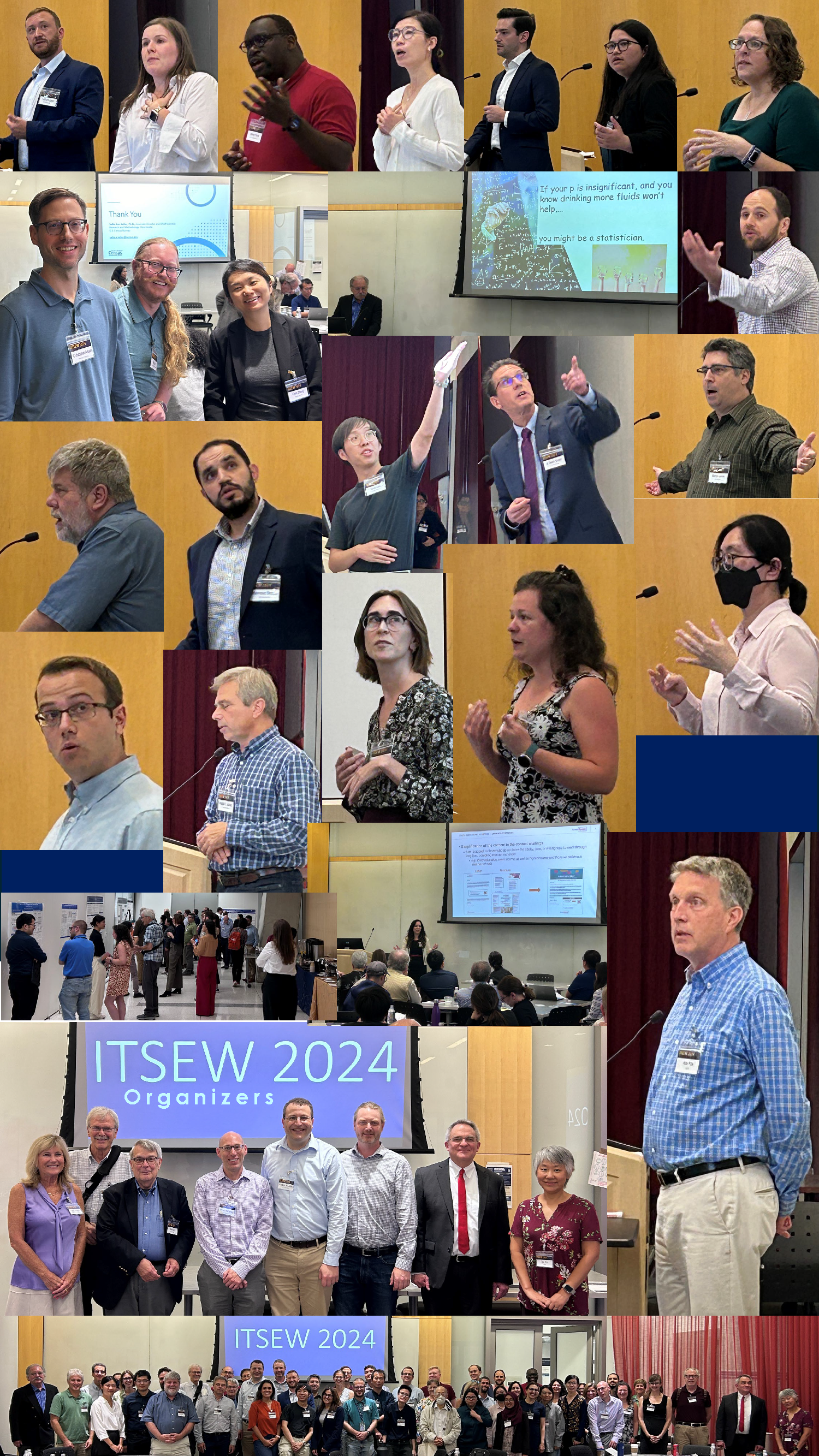
The NISS International Total Survey Error Workshop (ITSEW) 2024 Workshop brought together leading experts in survey methodology from across North America and beyond, focusing on innovative approaches to Total Survey Error (TSE) and data quality in the 21st century. The workshop was held on September 18-20, 2024, on the George Washington University campus and delivered comprehensive exploration of current challenges and advancements in survey research.
Highlights of the workshop included plenary speakers Dr. Robert Groves, Georgetown University, A 21st Century Data Infrastructure, Dr. Sallie Ann Keller, U.S. Census Bureau, Total Survey Error and Total Uncertainty Analyses Viewed through the Lens of Statistical Products First, Dr. Paul Beimer, PPB Consulting, Sunset Salvo: Reprise, and Dr. Jerome P. “Jerry” Reiter, Duke University, Modeling for Nonresponse and Measurement Error with Survey Weighted Data when some Margins are Known from External Data Sources.
Lively discussions and networking highlighted the talks over the three days. With just over eighty registrants, the workshop broached the critical need for a modern data infrastructure that can adapt to the evolving landscape of survey data collection and analysis (see presentation listing below). Participants from around the world converged on Washington, DC coming from Brazil, Canada, China, Germany, Netherlands, and the United Kingdom, as well as all over the United States.
The National Institute of Statistical Sciences (NISS) was extremely pleased and grateful to receive support from the George Washington University Department of Statistics/Professor & Chair, Huixia Judy Wang and GWU School of Engineering and Applied Science's, Sandra Little, and our generous sponsors NORC at the University of Chicago, RTI International, and Westat.
Attendees also had the opportunity to engage with a diverse range of research through poster presentations covering topics such as attrition bias in longitudinal surveys, happiness measurement design effects, and practical case prioritization strategies.
NISS proudly hosted three of ITSEW's founders at the 2024 installation. ITSEW was created in 2005 by Paul Biemer, Alan Karr, and Jerry Reiter, and began under the NISS Affiliates Program, being held at the Bureau of Labor Statistics. Its goal was to foster discussion and research on total survey error, featuring work in progress and active discussions. After a hiatus, ITSEW resumed in 2008 and continued annually until 2019, held in various global locations. Lars Lyberg notably organized ITSEW 2009 in Sweden and a short course in 2019 in Italy. The pandemic caused cancellations in 2020, 2022, and 2023, with a virtual meeting in 2021. The 2024 in-person meeting in Washington saw many first-time attendees. ITSEW hopes to continue in-person meetings biennially, expanding into new data forms, technologies, and survey error sources.
NISS also wishes to extend praise to our ITSEW 2024 Organizing Committee who relentlessly led this workshop to greatness! With much thanks and gratitude, we honor our organizers below:
-
- Marcus Berzofsky, RTI International, berzofsky@rti.org (chair)
- Alan Karr, Temple University, alan.karr@temple.edu
- David S. Matteson, NISS Director/Cornell University, director@niss.org
- Ernest Fokoue, Rochester Institute of Technology
- James Rosenberger, Penn State University, JLR@psu.edu
- John Eltinge, US Census Bureau, john.l.eltinge@census.gov
- Jonathan Mendelson, Bureau of Labor Statistics, mendelson.jonathan@bls.gov
- Joshua Landon, George Washington University, jlandon@gwu.edu
- Randy Freret, NISS, rfreret@niss.org
- Ting Yan, Westat, tyanuconn@gmail.com
- Vicki Pineau, NORC at the University of Chicago, pineau-vicki@norc.org
Wednesday, September 18, 2024
Robert Groves, Georgetown University, motrya.calafiura@georgetown.edu
A 21st Century Data Infrastructure for the United States
Beatrice Baribeau, Statistics Canada, beatrice.baribeau@statcan.gc.ca
Ipek Bilgen, NORC at the University of Chicago, bilgen-ipek@norc.org
Impact of Equitable Communication Strategies During Panel Recruitment on Nonresponse and Measurement Errors
Sallie Ann Keller, U.S. Census Bureau, sallie.a.keller@census.gov
Brad Edwards, Westat, bradedwards@westat.com
Extending TSE to Biomarker Quality
Dan Liao, RTI International, dliao@rti.org
Karolina von Glasenapp, GESIS - Leibniz Institute for the Social Sciences, Germany, karolina.glasenapp@gesis.org
Chris Lam, Statistics Netherlands, c.lam@cbs.nl
Analyzing Measurement and Representational Errors in Smart Survey Datasets used for Machine Learning
Curtiss Engstrom, University of Michigan, cwengstr@umich.edu
J. David Brown, U.S. Census Bureau, j.david.brown@census.gov
Citizenship Question Effects on Noncitizen Household Response
Grace Guynn, Federal Reserve Bank of Atlanta, grace.guynn@atl.frb.org
Constructing Representative Sampling Frames From Commercial Vendors
Jason Kosakow, Federal Reserve Bank of Richmond, jason.kosakow@rich.frb.org
Jake Soffronoff, Institute of Museum and Library Sciences, jsoffronoff@imls.gov
Thursday, September 19, 2024
Lilian Huang, NORC at the University of Chicago, huang-lilian@norc.org
Impact of Record Linkage Quality on Survey Error: A Case Study
Danny Friel, U.S. Bureau of Labor Statistics, friel.daniel@bls.gov
A Scalar Method for Variance Estimation of the Modeled Wage Estimates
Jeremy Flood, North Carolina A&T State University, jrflood@aggies.ncat.edu
Survey Data Integration for Distribution Function Estimation
Graham ‘Gray’ Jones, Bureau of Labor Statistics, jones.graham@bls.gov
Data Quality Profile Used in the Consumer Expenditure Surveys (CE)
Zachary Seeskin, NORC at the University of Chicago, zach.seeskin@gmail.com
TSE for Multiple Vaccination Coverage Estimates from the 2022 National Immunization Survey for Young Children (NIS-Child)
Shalima Zalsha, NORC at the University of Chicago, zalsha-shalima@norc.org
TSE for COVID-19 vaccination Coverage Among Children and Teens Using the 2023 NIS-Child COVID Module
Elizabeth Allen, NORC at the University of Chicago, allen-elizabeth@norc.org
Adult COVID-19 Vaccination Coverage from the 2023 NIS-Adult COVID Module
Paul Biemer, PPB Consulting, ppb@rti.org
Ai Rene Ong, American Institutes for Research, aong@air.org
Assessing the Use of Multiple Sources of Auxiliary Data for Tailored Survey Designs
Burton Levine, RTI International, blevine@rti.org
Combining a Probability ABS Sample with a Nonprobability Social Media Sample
Michael Elliott, University of Michigan, mrelliot@umich.edu
Alexander Haas, NORC at the University of Chicago (ahaas128@aol.com) and Zachary Seeskin, NORC at the University of Chicago
Extending a Data Quality Scorecard to Assess Fitness for Use of Blended Data Sources
Katherine Davies, Office for National Statistics (UK), katie.davies@ons.gov.uk
Understanding Error in UK Travel and Tourism Estimates
Mahmoud Elkasabi, RTI International, melkasabi@rti.org
National Center for Health Statistics Rapid Surveys System: Calibrating Blended Samples
Ting Yan, NORC at the University of Chicago (prev. Westat), tyanuconn@gmail.com
Friday, September 20, 2024
Jerry Reiter, Duke University, jreiter@duke.edu
Marta Murray-Close, U.S. Census Bureau, mmurrayclose@gmail.com
Survey-First vs. Administrative Record-First Approaches to a Census
Joseph L. Schafer, U.S. Census Bureau, Joseph.L.Schafer@census.gov
Total Uncertainty Analysis for the U.S. Decennial Census
Alan Pate, Battelle, patea@battelle.org and Paul J. Lavrakas, Independent Consultant, pjlavrakas@comcast.net
POSTERS
Aulia Dini Rafsanjani, University of Michigan, aulia@umich.edu
The Construction of Weight Adjustment to Mitigate Attrition Bias in Longitudinal Survey
Chan Zhang, Zhejiang University, chanzh05@gmail.com
John Tsang, University of Ottawa, john.tsang@uottawa.ca
Correcting Selection Bias in Non-Probability Two-Phase Payment Survey
Joy Wu, Bank of Canada, jwu@bank-banque-canada.ca
Pei Geng, University of New Hampshire, pei.geng@unh.edu
Rui Jiao, Westat, ruijiao@westat.com
A Practical Approach for Case Prioritization in A Panel Survey
William Waldron, National Center for Health Statistics, nap2@cdc.gov
Two-Stage Systematic Cluster Sampling in the NHIS 2020 Design
ATTENDEES
-
- Amanda Cardone, RTI International, acardone@rti.org
- Amber Levanon Seligson, National Science Foundation, alevanon@nsf.gov
- Andrew Thompson, US Veterans Administration, andrew.thompson3@va.gov
- Ashley Thompson, US Department of Agriculture, Ashley.Thompson4@usda.gov
- Christian McCarthy, Bureau of Labor Statistics, mccarthy.christina@bls.gov
- Christopher Antoun, University of Maryland, antoun@umd.edu
- Daniel Markelon, Bureau of Labor Statistics, markelon.daniel@bls.gov
- Darcy Miller, US Department of Agriculture, darcy.miller@usda.gov
- Dean Resnick, NORC at the University of Chicago, resnick-dean@norc.org
- Dee Zamora, Bureau of Labor Statistics, zamora.dee@bls.gov
- Denise Abreu, US Department of Agriculture, denise.abreu@usda.gov
- Greg Erkens, Bureau of Labor Statistics, erkens.gregory@bls.gov
- Heng Chen, Bank of Canada, chhe@bankofcanada.ca
- Jason Hsia, Centers for Disease Control & Prevention, zxx1@cdc.gov
- Joshua Gross, Bureau of Labor Statistics, gross.joshua@bls.gov
- Kim Dorazio, M. Davis & Co., kim@mdavisco.com
- Lauren Rossen, Centers for Disease Control & Prevention, lrossen@cdc.gov
- Linda Young, US Department of Agriculture, linda.j.young@usda.gov
- Luca Sartore, NISS / NASS / USDA, lsartore@niss.org
- Maria Luiza Toledo, Escola Nacional de Ciências Estatísticas (Brazil), malutoledo83@gmail.com
- Matt Jans, Centers for Disease Control & Prevention, uea7@cdc.gov
- Michael Ikeda, US Census Bureau, michael.m.ikeda@census.gov
- Rafia Mijiyawa, Bureau of Labor Statistics, mijiyawa.rafia@bls.gov
- Rebecca Medway, American Institutes for Research, rmedway@air.org
- Shawna Waugh, Energy Information Administration, Shawna.Waugh@eia.gov
- Steve Mance, Bureau of Labor Statistics, mance.steven@bls.gov
- Wan-Ying Chang, National Science Foundation, wchang@nsf.gov
- Yangyang Deng, University of Maryland, ydeng125@umd.edu
- Yulei He, Centers for Disease Control & Prevention, wdq7@cdc.gov



